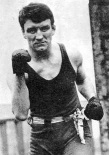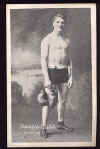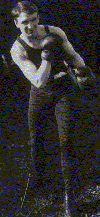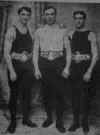|
Freddie Welsh was a great exponent
of defensive boxing. Always remaining calm in the ring, he
was an extremely elusive opponent which was particularly frustrating for
fighters who didn't have his skills but relied upon power and aggression.
He welcomed the opportunity to fight a brawler, fully confident that he would be
able to outmanoeuvre him - and not
averse to trying a few tricks of his own ! Welsh was a clever counter-puncher who believed in
feinting and shifting his
body to draw his opponent
out of position.
The
Early Days
Unlike other great Welsh boxers of his era who were born into poverty and took
to boxing as a means of survival, Frederick Hall
 Thomas did not need to
box. His father was a successful businessman who provided the family with
a comfortable living. However, Freddie was
frequently ill as a child with signs of
consumption so his parents hired a physical fitness expert
to help build up his
frail body. Much to his parents surprise Freddie's fitness expert advised
him to take up boxing reasoning that it was the best sport to improve his
lungs; more surprising was the way young Freddie took to the sport. Freddie
grew into a headstrong and determined young man who announced to his mother
that, at the age of sixteen, he was going to America to seek his fortune. Thomas did not need to
box. His father was a successful businessman who provided the family with
a comfortable living. However, Freddie was
frequently ill as a child with signs of
consumption so his parents hired a physical fitness expert
to help build up his
frail body. Much to his parents surprise Freddie's fitness expert advised
him to take up boxing reasoning that it was the best sport to improve his
lungs; more surprising was the way young Freddie took to the sport. Freddie
grew into a headstrong and determined young man who announced to his mother
that, at the age of sixteen, he was going to America to seek his fortune.
After a few lean
years in America where Freddie lived the life of a hobo, jumping trains
and just eking out enough to live on, he finally made the decision to
literally fight for his living. Not wanting his mother to know that he was
boxing Freddie decided to take the name Freddie Cymro
(Cymro is Welsh for 'Welshman')
however his wife suggested that the pronunciation may confuse the
American public and that Freddie Welsh would be just as appropriate and
more readily accepted.
Upon turning
professional
Freddie quickly established himself, mainly on the East Coast, as a boxer
of rare quality. After a series of wins Freddie returned to his homeland
after receiving news that his mother was seriously ill.
First
Pro Fight
His
first fight in England came at the National Sporting Club where his American boxing
exploits had gone
 before him. A clear six round win against Seaman Hayes
was the result. Having displayed his great range of skills during his
first fight at the N.S.C. the members wanted to see more of this talented
fighter and a contest against Young Josephs was to be Freddie's next challenge. The
first 3 rounds were fought toe to toe until in the fourth Freddie began to
get on top of his 10lb heavier opponent. For the rest of the fight Freddie
was just too smart for his game opponent, putting Josephs down in the 13th
and 14th rounds before being declared the winner at the end of the 15th on
a points decision. before him. A clear six round win against Seaman Hayes
was the result. Having displayed his great range of skills during his
first fight at the N.S.C. the members wanted to see more of this talented
fighter and a contest against Young Josephs was to be Freddie's next challenge. The
first 3 rounds were fought toe to toe until in the fourth Freddie began to
get on top of his 10lb heavier opponent. For the rest of the fight Freddie
was just too smart for his game opponent, putting Josephs down in the 13th
and 14th rounds before being declared the winner at the end of the 15th on
a points decision.
Later
that year, at the St Mary Hill Fair, Freddie fought a six round exhibition
with fellow Welsh boxing great, Peerless Jim Driscoll. It truly was an
exhibition - of all the finest skills of the noble art. The two men were
good friends at this time and the exhibition aroused a lot of speculation
amongst each other's fans as to who would emerge the victor in a real
fight..
 Two
fights in one night Two
fights in one night
Freddie
Welsh was a very shrewd man both inside and outside the ring. He would add to
his purses by staging side bets on himself, as well as
being capable of
always negotiating the best financial deal for his fights. One
particularly bizarre arrangement he undertook was to fight two men on the
same night but would only receive a purse if he stopped both men -
confidence in his own ability indeed ! First up was Gunner Hart who claimed to be welterweight
champion of the Navy. After an extremely one sided bout the referee
stopped the contest in the fifth round with Hart having put up a game
fight but being no match for the talented Welshman. Next was Arthur Ellis,
holder of the English lightweight title. Again the fight only lasted five
rounds, with Ellis having visited the canvas four times during the course
of the bout.
British
Title
Welsh
later returned to America whereupon after another impressive list of
victories he met with his first defeat at the hands of Packy McFarland in
a controversial home town decision. More victories followed including a
fine win over 15 rounds against featherweight great, Abe Attell. Being in
great demand on both sides of the Atlantic, Freddie went back to the U.K.
in 1909 to fight Johnny Summers for the British lightweight title
which he won after 20 rounds.
Butt ref ! Peerless Jim
beaten
Again,
he became involved in a controversial fight when he was matched against
the other great Welsh fighter of the day, Peerless Jim Driscoll. Although
they were friends, the pre-fight reports in newspapers and comments
amongst fans were so intense, such was the excitement ev erywhere in the
build up to the fight, that by the time of the actual bout the friendship
was no more. What should have been a feast of skill was ruined by
Freddie's insistence of holding and employing rough house tactics to
prevent Driscoll boxing in his usual exemplary style. At every opportunity
Welsh fouled Driscoll until in the 10th round Driscoll snapped, unable to
continue to put up with the dirty fight Freddie was employing.
Driscoll blatantly head-butted Welsh full in the face leaving the referee
no alternative but to disqualify him. In his very next bout Freddie lost
his British title to the very capable fighter, Matt Wells
on points over 20 rounds. A decision he
was to later reverse. erywhere in the
build up to the fight, that by the time of the actual bout the friendship
was no more. What should have been a feast of skill was ruined by
Freddie's insistence of holding and employing rough house tactics to
prevent Driscoll boxing in his usual exemplary style. At every opportunity
Welsh fouled Driscoll until in the 10th round Driscoll snapped, unable to
continue to put up with the dirty fight Freddie was employing.
Driscoll blatantly head-butted Welsh full in the face leaving the referee
no alternative but to disqualify him. In his very next bout Freddie lost
his British title to the very capable fighter, Matt Wells
on points over 20 rounds. A decision he
was to later reverse.
World
Title
Freddie Welsh was given his
chance of becoming World Champion when in 1914 he was matched with the
current champion Willie Ritchie, from
California. The fight took place in London. In a
compelling fight, over 20 rounds, Welsh boxed at his brilliant best to
take the decision and was crowned World Lightweight Champion.
Era of no-decisions
Returning to
America, Welsh took
absolutely no chance of losing his title when he decided to fight for
large purses but only in no-decision bouts. This meant the only way he
could possibly lose his title was by knockout. It proved to be a lucrative way
of cashing in on his status; though not exactly sporting it was a fairly
common practice at the time and was certainly
a shrewd move. Freddie had fought, and beaten, all of the top lightweights
on his way to the title; he avoided no-one, so why not cash in after all
those years of hard work? However, the
seemingly impossible happened when in 1917 he fought Benny Leonard -
for the third time. By now Freddie was 31 years old and conceding 10 years
to his opponent, who defeated him in 9 rounds to claim the world title.
It is said that Welsh's manager had gambled on his fighter winning this
bout using Freddie's entire purse to do so !
Retirement
After the Great War Freddie Welsh
went on to participate in more contests during 1920 - 1922, before bringing
the curtain down on his illustrious career following a 10 round defeat by Archie
Walker. Retiring as a wealthy man Freddie bought a health farm and ran a
gymnasium. Sadly, he lost it all in the
Great Depression and died
penniless.
|